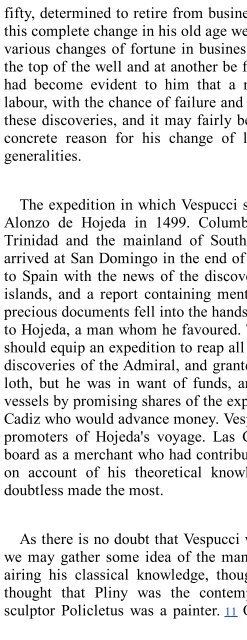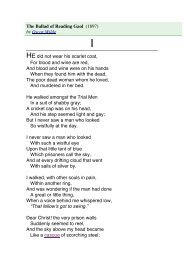You also want an ePaper? Increase the reach of your titles
YUMPU automatically turns print PDFs into web optimized ePapers that Google loves.
fifty, determined to retire from business and <strong>go</strong> to sea. His own reasons for<br />
this complete change in his old age were that he had already seen and known<br />
various changes of fortune in business; that a man might at one time be at<br />
the top of the well and at another be fallen and subject to losses; and that it<br />
had become evident to him that a merchant's life was one of continual<br />
labour, with the chance of failure and ruin. It was rather late in life to make<br />
these discoveries, and it may fairly be suspected that there was some more<br />
concrete reason for his change of life which he concealed under these<br />
generalities.<br />
The expedition in which Vespucci sailed was organised and fitted out by<br />
Alonzo de Hojeda in 1499. Columbus, having discovered the island of<br />
Trinidad and the mainland of South America on the 31st of July 1498,<br />
arrived at San Domin<strong>go</strong> in the end of August. In October he sent five ships<br />
to Spain with the news of the discovery, a chart of the new coast-line and<br />
islands, and a report containing mention of the existence of pearls. These<br />
precious documents fell into the hands of Bishop Fonseca, <strong>who</strong> showed them<br />
to Hojeda, a man <strong>who</strong>m he favoured. The Bishop suggested that his protégé<br />
should equip an expedition to reap all the advantages to be derived from the<br />
discoveries of the Admiral, and granted him a licence. Hojeda was nothing<br />
loth, but he was in want of funds, and only succeeded in fitting out four<br />
vessels by promising shares of the expected profits to persons in Seville and<br />
Cadiz <strong>who</strong> would advance money. Vespucci seems to have been one of these<br />
promoters of Hojeda's voyage. Las Casas supposes that he was taken on<br />
board as a merchant <strong>who</strong> had contributed to the expenses, and also possibly<br />
on account of his theoretical knowledge of cosmography, of which he<br />
doubtless made the most.<br />
As there is no doubt that Vespucci wrote the famous letters from Lisbon,<br />
we may gather some idea of the man from their contents. He was fond of<br />
airing his classical knowledge, though it was a mere smattering; for he<br />
thought that Pliny was the contemporary of Mecænas, 10 and that the<br />
sculptor Policletus was a painter. 11 On the other hand he quotes Petrarch,





